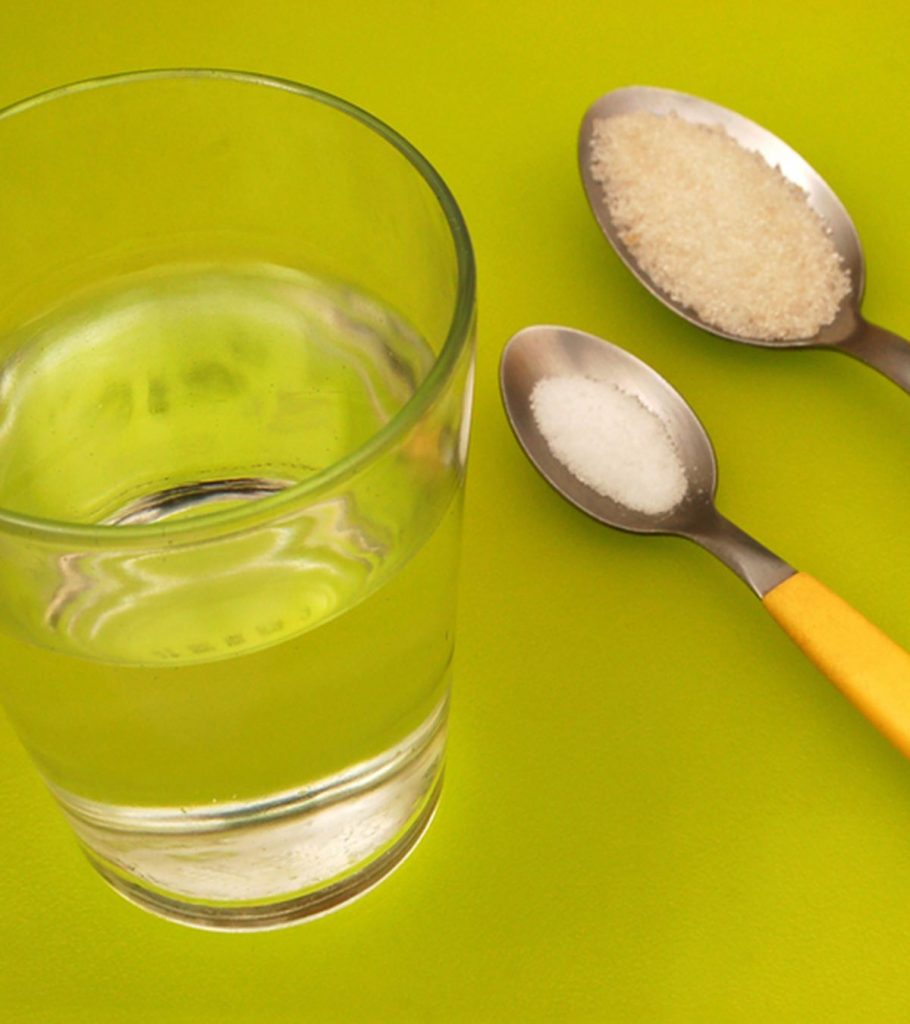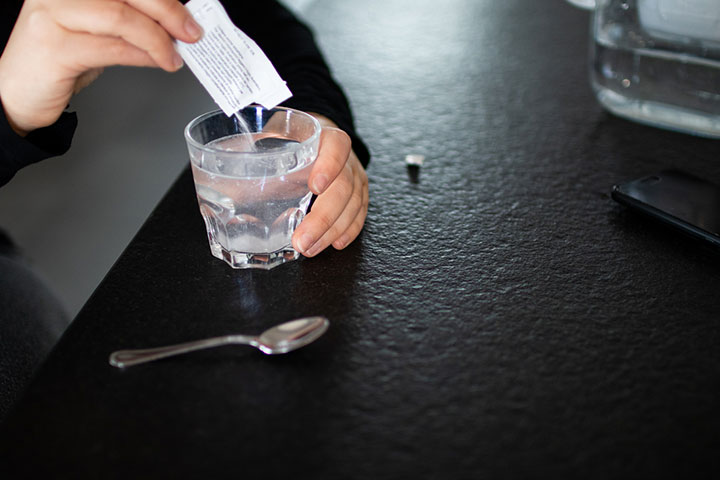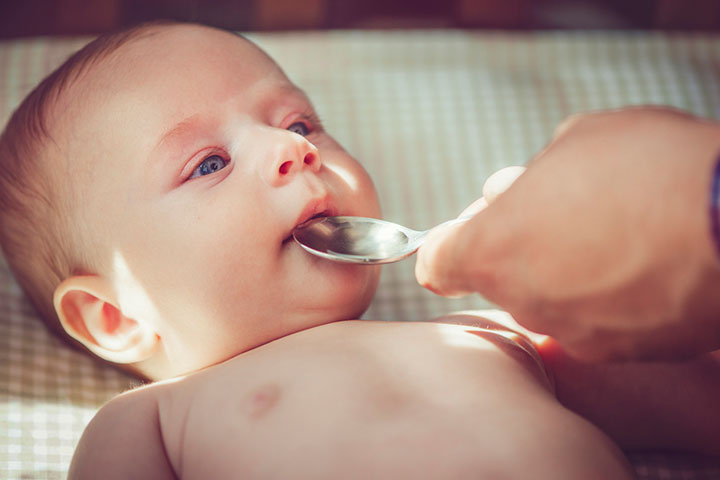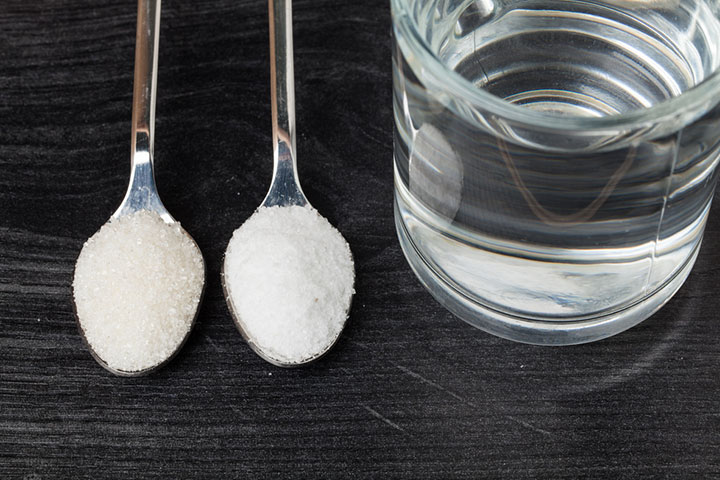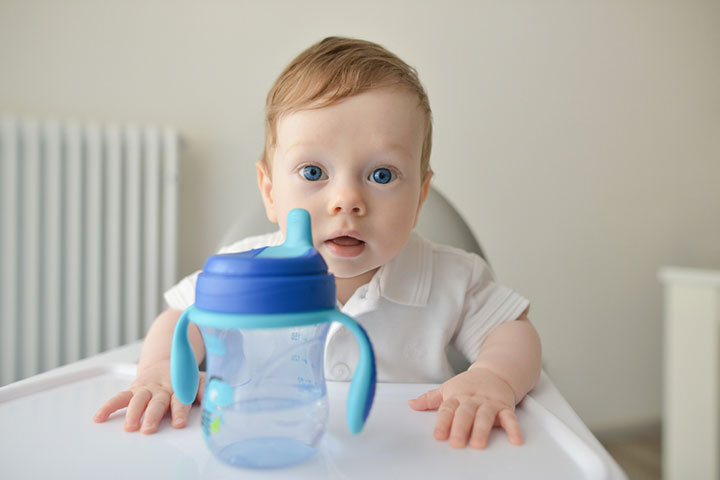Oral rehydration salts (ORS) is an oral rehydration formula made of dry salts and is recommended by the World Health Organization (WHO). You may prepare a solution of ORS for babies at home by mixing salt and sugar in the prescribed quantity of clean drinking water. You can also purchase ORS as a powder or as a pre-mixed liquid oral rehydration solution, also called ORS, from a drugstore or pharmacy.
Oral hydration using ORS replenishes the water and electrolytesiXElectrically charged minerals present in body fluids that regulate the smooth functioning of the nerves, cells, muscles, heart, and brain lost from the body during health conditions such as diarrhea. Hence, ORS is a common component of oral rehydration therapy (ORT).
Keep reading this post to learn more about when babies need ORS, its benefits, the right quantities to administer it, and tips to make ORS at home.
When Do Babies Need Oral Rehydration Therapy (ORT)?
Babies need ORT when they lose excess water and electrolytes from their bodies. Several conditions and factors could cause loss of electrolytes and fluids. Babies are vulnerable to infections, gastrointestinaliXRelated to the stomach and intestines illnesses, and issues that can cause persistent diarrhea and vomiting, leading to acute dehydration.
Dehydration can lead to several adverse health effects, making ORS use under the pediatrician’s guidance imperative for rehydration and fluid replacement. Below are some signs of dehydration in infants (1).
- Severe thirst
- Crankiness and restlessness
- Less number of soiled diapers due to less urination
- Dark yellow urine
- No tears while crying
- Dry corners of the mouth and chapped lips
- Sunken soft spot or fontanellesiXSoft membranous spots between the bones and the skull of a baby’s head on the top of the head
- Sunken eyes
- LethargyiXThe feeling of laziness, low energy, or lack of willingness to do an activity
If your baby is exhibiting any of these symptoms, consult a pediatrician and discuss ORT. In severe dehydration, the baby may become dizzy and lose consciousness.
What Are The Benefits Of Oral Rehydration Solution?
Oral rehydration salts or solutions contain sodium chloride, anhydrous glucose, potassium chloride, and trisodium citrate (dihydrate) (2). The salts help maintain electrolyte balance in the body, while glucose provides the energy to recover, recuperate, and heal.
Below are some other benefits of ORS (3).
- It is cost-effective and readily available.
- It is easy-to-prepare and easy-to-administer at home.
- It contains the right ratio of salts necessary to maintain the body’s osmolarityiXThe amount of osmoles concentration present in a liter of solution, which is essential to keep the body’s physiological harmony.
- It acts fast as the solution contains simple salts that readily enter the bloodstream.
- It can be administered orally, so even individuals without a medical background can administer it easily.
How To Give ORS To Infants?
Below are the steps to make an ORS and administer it to babies.
- Boil 200ml of clean drinking water in a clean and sterilizediXSomething that went through the cleansing process to kill bacteria utensil and then cool it.
- Pour this water into a glass and mix it with a teaspoon of ORS powder. Stir well until the powder completely dissolves and the solution appears cloudy. Don’t mix ORS in milk, fruit juice, or any other fluid.
- Wash your hands before feeding ORS to the baby.
- Children under two should be given a teaspoon of this solution every one to two minutes using a spoon, dropper, or feeder throughout the day (4). Don’t use bottles to feed ORS.
- Infants and children are advised one to two liters of ORS over 24 hours, although the quantity could vary depending on the baby’s health. Consult a pediatrician to determine the quantity of ORS your baby needs.
- Feed as much ORS as advised for the baby in 24 hours and discard the remaining unused solution. Make a fresh solution every 24 hours.
Dr. Kristen Cook, a Chicago-based board-certified pediatrician, says, “The reason oral rehydration solutions need to be used within 24 hours is to prevent the growth of bacteria within the solution. Once a bottle of ORS is opened, the fluid inside is exposed to a potentially contaminated environment, which could lead to bacterial growth and make an already ill child even sicker.”
You can also use packaged, pre-mixed liquid ORS and begin from step three mentioned above. Your baby may also receive other medications to control diarrhea and vomiting that cause dehydration. If ORS does not improve the baby’s health, speak to the doctor.
What Quantity Of ORS Solution Does A Baby Need?
The quantity of ORS needed by a baby depends on the severity of dehydration. It could also depend on the frequency of vomiting or diarrhea. For instance, according to UNICEF, children under two years need one-fourth to one-half of a large cup (250ml) of ORS solution after each watery or loose stool. Children older than two years need half to one liter after each watery stool (5).
The precise quantity of ORS needed could vary due to several factors, including if the baby is receiving other medications. Therefore, speak to a pediatrician to determine the quantity of ORS solution appropriate for your baby.
What To Do If ORS Is Not Available?
If oral rehydration salts or solutions are unavailable, you may prepare ORS for the baby at home. Below are the steps to make ORS at home (6).
- Wash your hands using soap and water. Ensure the utensils you are using to make the solution are clean and sterilized.
- Mix six level teaspoons of sugar and one-half level teaspoon of salt in one liter of clean boiled and cooled water. You may use molasses (a form of raw sugar) instead of white sugar since molasses contain more potassium.
- Stir the mixture well until the sugar and salt dissolve entirely, resulting in a faint opaque solution.
- Feed as much solution as the baby needs or as advised by the doctor. Alternatively, feed other fluids, such as breast milk.
- If a baby vomits, stop for ten minutes and re-feed ORS. Feed small quantities as the baby will be able to tolerate it better.
- You can store fresh ORS in a cool place. Chilling the ORS in a refrigerator is good, but it should not be used for more than 24 hours after preparation.
Babies older than six months can be given different foods, such as gruels, rice water (congee), carrot soup, and tender coconut water, for hydration. Once the baby is rehydrated and their digestive system seems at ease, you may begin feeding them a regular diet after consulting your doctor.
Are There Any Side Effects Of ORS?
ORS solution, when administered in recommended quantities, does not lead to side effects. Overfeeding ORS may cause complications, such as electrolyte imbalance and water retention. In rare cases, ORS may not be suitable for babies with some health conditions or those on some medications.
Incorrectly prepared homemade ORS may have counter effects. For instance, too much sugar or salt in the ORS could worsen diarrhea. If you suspect your baby is displaying side effects to ORS, consult a healthcare provider.
Precautions To Take While Feeding ORS To Babies
Below are some precautions to observe while feeding ORS to a baby (7).
- Avoid feeding ORS to babies with impaired renal function, gastrointestinal obstruction, or chronic health problems without consulting a doctor first.
- Discuss with your doctor about the time for administering other medicines if the baby is on ORS.
- Don’t use an ORS solution for more than three to four days unless directed otherwise by your doctor.
- Avoid feeding ORS in one gulp since it may exacerbate vomiting in some babies. Instead, use a spoon or a sippy cup to feed small quantities over a short period.
As per pediatricians’ recommendations, you may give ORS for babies to replenish body fluids and electrolytes lost in vomiting and diarrhea. You may mix the ORS packet in clean drinking water in recommended measures. Salts in ORS maintain the electrolyte and fluid balance, glucose provides energy, and water hydrates the baby. Most babies require an ORS solution each time after watery stools. Excess feeding of ORS can cause electrolyte imbalances and water retention in babies. It is also important to treat gastrointestinal issues’ underlying causes with rehydration therapy. Babies with severe vomiting and diarrhea may require intravenousiXAdministered or connected through a vein rehydration in hospital settings.
Key Pointers
- ORS helps replenish the body fluids and salts lost from vomiting and diarrhea, thereby preventing dehydration.
- Dark yellow smelly urine, no tears while crying, chapped lips, sunken eyes, etc., are some signs of dehydration in babies.
- The quantity of ORS a child needs depends on their age and the severity of dehydration.
Learn how oral rehydration therapy can help your child regain the lost fluids. Get the facts on this simple, effective treatment in this video.
